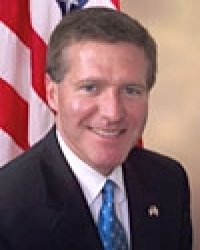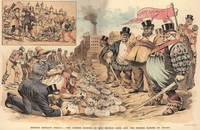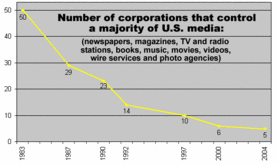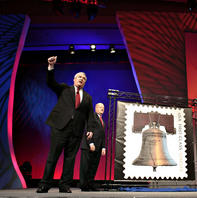Just as General Motors has in effect subsidized Big Oil by continuing to build gas-guzzlers in recent years, so has the USPS continued to subsidize Big Mail by shaping its operations to encourage what it now calls, revealingly, “standard mail”—that is, advertising junk mail. Most American citizens are blissfully unaware of the degree to which USPS subsidizes U.S. businesses by means of the fees it collects from ordinary postal customers. For example, if you wish to mail someone a large envelope weighing three ounces, you’ll pay $1.17 in postage. A business can bulk-mail a three-ounce catalog of the same size for as little as $0.14.And the USPS’s own “standard mail” is about to pop. It’s worse than you probably think. An article well worth reading.USPS management claims that “standard” mail makes lots of money, that the USPS makes a better margin delivering a “standard” mail package for $0.14 than it does a first-class one for $1.17. Why? Supposedly because of efficiencies produced by bulk-mail, machinable, zip-plus-four and zip-plus-nine standardization schemes. If you look at the revenue stream from advertising mail, it does look impressive, and it has been growing (for perverse reasons we’ll come to in a minute). But when you juxtapose next to that revenue stream the enormous transactional costs of maintaining a riotously complex rate structure to service it, you quickly reach a different conclusion: Standard mail, the costs of which are also generally tax-deductible for businesses, does not make money. It amounts to a corporate subsidy, which helps to explain why Congress, insofar as its members understand this, typically doesn’t object to the status quo. After all, these corporations have been known to contribute to electoral campaigns.
Actually, it’s worse than that. Not only are pennies shaved off the postage affixed to grandma’s letters routed directly into the pockets of direct-mail marketers, some 20 percent of direct-mail advertising volume is comprised of credit card, mortgage and other financial offers. So yes, the USPS has contributed in a subtle yet very real way to our burst economic bubble.
Category Archives: Postal Service
Postal Hikes and Time Warner’s Role Discovered by New York Review of Magazines
 The New York Review of Magazines catches up with Time Warner and the postal
rate hikes it lobbied for and got.
First, the bottom line:
The New York Review of Magazines catches up with Time Warner and the postal
rate hikes it lobbied for and got.
First, the bottom line:
…the true price of letting corporations shape government policy: free speech.The NYRB gets into some of the underlying political machinations:— Going Postal, Callie Enlow, New York Review of Magazines, 2008
Even Time Warner was taken aback. Halstein Stralberg, co-creator of Time’s rate proposal, said, “There was a new chairman at the commission and there was a totally new environment, and they adopted it, to my surprise.”The NYRM noted the sudden parachuting in of a new chairman just before the decision as unusual:
In the corporate world, The Progressive Populist would most likely be forced out of business. But should the same rules apply when the product is ideas and the conduit is a government-owned monopoly? To the current administration, the answer is yes, said Cullen. The president appoints the five commissioners that compose the Postal Regulatory Commission. Between the 2005 Time Warner complaint, when the PRC rejected the corporation’s proposed rate restructuring, and the 2006 rate hearings, when the PRC adopted the suggestions almost verbatim, two new commissioners joined the PRC. One of them, Dan G. Blair, replaced George Omas as chairman just one month before the end of the rate cases, a move that Bob Cohen described as “pretty unusual.”However, the NYRM didn’t follow up on the other chairman, the chairman of the Postal Board of Governors from January 2005 to January 2008, James C. Miller III, and his 27-year-old theory:
“…none should be favored and none benefited. Each party pays the cost of service it consumes, not less, and does not bear the cost of others’ consumption.”Curious how someone with that philosophy should be chairman just at the time the decision was made.
The NYRM does say what happened, why it was unusual, and who it affected: Continue reading
Big picture: Net Neutrality vs. Social Control by Big Media
Do we want the Internet to go the way of newspapers, radio, and TV, and even the postal service, with 90+% of content provided by half a dozen big corporations and only op-eds and heavily selected and edited letters permitted from the great unwashed? Hey, they’ve got that in China, and there most of the population believes that Tibetans are barbarian recipients of superior Chinese culture, so Chinese troops are totally justified in squashing any ungrateful opposition. We could return to depending on the traditional media in the U.S.; after all, they only helped lie us into a war of choice in Iraq, costing $2 billion a week that we could be using to deal with education, health care, and preserving the natural world. Or we can fight for Internet freedom.
-jsq
Where the Recipient is Going to Be: Any E-Mail, File Transfer, or Web Search
 People are surprised to learn this?
People are surprised to learn this?
In the end, it turns out it’s all about the emails.The blogger goes on to point out that almost all of the recent fearmongering, which has been about telephone calls, is just plain wrong. Duh! Half the fearmongers don’t understand what they’re talking about (e.g., Continue reading— Spying Fight about Emails, Not Phone Calls, DOJ Reveals, By Ryan Singel ThreatLevel, Wired, March 04, 2008 | 4:47:36 PMCategories: NSA
Heck of a Job, Stickler

|
Also coming to light, is the fact that Stickler’s nomination to head the mine administration was twice rejected by congress and rejected when republicans were still in charge. Rejected reportedly by senators who were concerned about Stickler’s safety record when he operated mines. After his nomination was twice rejected by the Senate, President Bush gave Richard Stickler the mine safety job with a recess appointment. That’s a presidential appointment made when congress is not in session.Dead people in mines. Dead people in Hurricane Katrina. Postal rate hikes for small publications. Wireless spectrum handed over to a few big companies. And of course massive consolidation of first mile Internet ISPs in the hands of companies that aren’t delivering on their promises and that indulge in repeated political censorship while cooperating with the government in wiretapping.Finally, congressional investigations and hearings are now expected to look at a key provision of federal mining law, one which requires the U.S. Government to be the main communicator when an accident occurs. ABC News now notes it took the mine safety administration two days to take public control of the Crandall Canyon Mine. ABC also adds, “Others were irate that [mine owner Bob] Murray was allowed to publicly predict success and contradict MSHA itself while agency officials quietly looked on.”
— Federal mine safety official’s credentials questioned, Chris Vanocur, ABC 4 News, Last Update: 8/20 2007 8:00 pm
The stakes going forward are even higher, including economic competitiveness, control of information, and political discourse and with it the survival of a political system.
At least the traditional media finally noticed the problem with the appointment of the Mine and Health Safety Administrator. Imagine if we had more proactive investigative media that might have actually noticed his appointment when it happened. And imagine if we had none, which is a very real possibility with continuing media consolidation and increasing control over the Internet by a very small number of companies.
-jsq
Crack Google?
 Cringely gets anxious over
Google’s floor bid for 700Mhz.
After pointing out that Verizon and AT&T coming around
to Kevin Martin’s leaked counterproposal of watered down
“open access” rules, he says:
Cringely gets anxious over
Google’s floor bid for 700Mhz.
After pointing out that Verizon and AT&T coming around
to Kevin Martin’s leaked counterproposal of watered down
“open access” rules, he says:
Look who Google is up against — all the largest Internet service providers in the U.S. Google will not win this even if they win the auction, because the telcos and cable companies are far more skilled and cunning when it comes to lobbying and controlling politicians than Google can ever hope to be. The telcos have spent more than a century at this game and Google hasn’t even been in it for a decade. And Google’s pockets are no deeper than those of the other potential bidders.Cringely is missing the point about who Google is up against. These outfits have not been the largest ISPs for more than a century. They’ve been telephone companies for more than a century. And being around for a long time isn’t necessarily a sure win. Look at the Vatican; it’s been around for two thousand years, and it’s managed to lose most of its traditional heartland of Europe. Sure, Google is fragile, in some senses even more fragile than Microsoft, as Cringely points out. But even Microsoft is losing market share from IE to an open source browser, Firefox. Google, as a proponent of open source that actually understands it, has a fair chance here. The incumbent duopoly telcos aren’t really in the Internet business; Google is.— Is Google on Crack?: Eric Schmidt bets the ranch on wireless spectrum, Robert X. Cringely, Pulpit, 27 July 2007
Maybe Cringely’s right that Google alone couldn’t win the auction. But Google and Sprint possibly could. Sure, Sprint is a phone company, too. But that doesn’t mean it’s going to side with the rest if it scents profit. Maybe with a little help from Apple.
Let’s hope that’s what Google is really up to, rather than expecting to get Martin to change the rules and then wait for AT&T to deliver another striped bass.
I also don’t think Cringely is taking into account the stakes here. Continue reading
Media Ownership
 While we’re on the general subject of
postal and Internet rates and a free press,,
let’s look at who owns the U.S. media:
While we’re on the general subject of
postal and Internet rates and a free press,,
let’s look at who owns the U.S. media:
In 1983, 50 corporations controlled the vast majority of all news media in the U.S. … When the 6th edition of The Media Monopoly was published in 2000, the number had fallen to six. Since then, there have been more mergers and the scope has expanded to include new media like the Internet market. More than 1 in 4 Internet users in the U.S. now log in with AOL Time-Warner, the world’s largest media corporation.This might be worth remembering the next time you hear that the market will sort out any problems and there’s no need for regulation. Would that there were a market so that that could be true.In 2004, Bagdikian’s revised and expanded book, The New Media Monopoly, shows that only 5 huge corporations — Time Warner, Disney, Murdoch’s News Corporation, Bertelsmann of Germany, and Viacom (formerly CBS) — now control most of the media industry in the U.S. General Electric’s NBC is a close sixth.
— Number of corporations that control a majority of U.S. media, Media Reform Information Center, accessed 21 June 2007
-jsq
None Should Be Favored
 What’s the theory behind
the recent postal rate changes?
The Chairman of the Postal Board of Governors spelled it out 27 years ago:
What’s the theory behind
the recent postal rate changes?
The Chairman of the Postal Board of Governors spelled it out 27 years ago:
“…none should be favored and none benefited. Each party pays the cost of service it consumes, not less, and does not bear the cost of others’ consumption.”And the Postal Regulatory Commission is following that theory. Continue reading— James C. Miller III and Roger Sherman, “Has the 1970 Act Been Fair to Mailers?” in Roger Sherman, ed., Perspectives on Postal Service Issues 63 (1980).
Postal Radio?
 What’s the point of a free press if it can’t be delivered?
What’s the point of a free press if it can’t be delivered?
To the surprise of many independent publishers, in February the Postal Regulatory Commission (PRC), the body in charge of determining postal rates, rejected a rate-hike plan that was submitted by the U.S. Postal Service, the people in the business of delivering the mail for the past 215 years. This plan was widely understood to call for an approximate 12 percent increase that would have hit all publications more or less equally.Why Time Warner? Continue readingInstead the PRC adopted a revised version of an extremely complicated proposal submitted by media conglomerate Time Warner that included a number of possible discounts favoring the largest publishers.
— Postal Rates = Free Press, Rate hike pushed by media conglomerate Time Warner threaten small and medium-circulation publications, By Robert W. McChesney, In These Times May 17, 2007